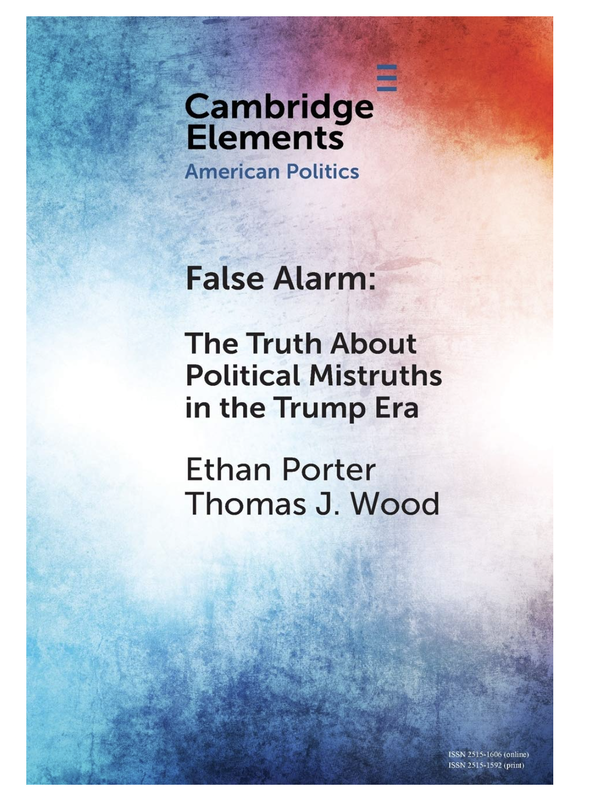False Alarm: The Truth About Political Mistruths in the Trump Era
With Thomas J. Wood. Cambridge University Press. 2019.
Americans are not invulnerable to factual information. They do not 'backfire'; facts do not make them less accurate. Instead, they become more accurate, even when corrections target co-partisans. Corrections of fake news yield similar results. Among Republicans, Trump's misstatements are less susceptible to corrections than identical misstatements attributed to other Republicans. While we do not observe facts affecting attitudes, multiple instances of misinformation can increase approval of the responsible politician - but corrections can reduce approval by similar amounts. While corrections do not eliminate false beliefs, they reduce the share of inaccurate beliefs among subjects in this study nearly in half. Media coverage: Politico. "No, We're Not Living in A Post-Truth World." The Times. "Truth Can Only Take You So Far In Politics." The publisher's page for this book is here. |
The Consumer CitizenOxford University Press. 2020.
Citizens are asked to buy, and asked to consider to buy, goods of all sizes and all prices, nearly all of the time. Appeals to political decision-making are less common. In The Consumer Citizen, Ethan Porter investigates how the techniques of everyday consumer experiences can shape political behavior. Drawing on more than a dozen original studies, he shows that the casual conflation of consumer and political decisions has profound implications for how Americans think about politics. Indeed, Porter explains that consumer habits can affect citizens' attitudes about their government, their taxes, their politicians, and even whether they purchase government-sponsored health insurance. The consumer citizen approaches government as if it were just an ordinary firm. Of course, government is not an ordinary firm---far from it---and the disjunction between what government is, and the consumer apparatus that citizens bring to bear on their evaluations of it, offers insight into several long-unanswered questions in political behavior and public opinion. How do many Americans make sense of the political world? The Consumer Citizen offers a novel answer: By relying on the habits and tools that they learn as consumers. Reviews "This path-breaking book shows that forms of thinking acquired in one personal or social domain may heavily influence thinking in others. It integrates literature from political science, economics, history, and elsewhere to theorize and show the importance of consumer thinking to politics and culture, primarily in the US but also overseas. It provides a novel and compelling approach to studying political attitudes and behaviors — and one that will surely guide the next generation of research." -- James N. Druckman, Northwestern University "A fascinating exploration of the influence of consumerism in politics that offers provocative insights into the surprising psychological interdependence of people's roles as citizens and consumers, with disturbing implications for people's ability to separate one from the other." -- Michael Norton, Harvard Business School "In an academically rigorous and delightfully relevant way, Ethan Porter argues that our lives as consumers and our lives as citizens have converged. As a result, he shows that the rules that help us navigate the supermarket are often applied to the far choppier waters of the political world. While some may see this as a cause for celebration and others for deep concern, its recognition should spark long overdue consideration about the nature of our multiple roles in society, and that way we seek and find meaning across them." -- Cait Lamberton, The Wharton School The publisher's page for this book is here. |


